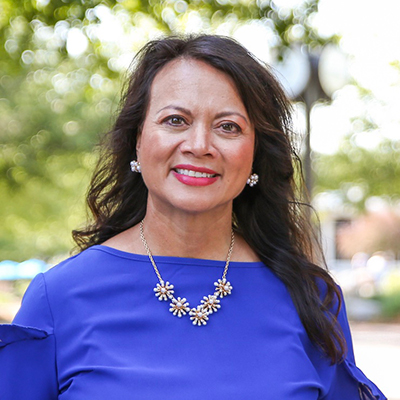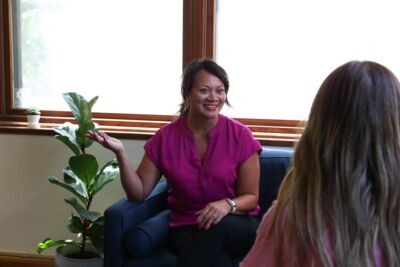Mental Health Resources
Your college experience can be exciting, but it can also be a stressful time in your life. If you're feeling overwhelmed or need someone to talk to, our mental health counselors can help.
If you are experiencing a mental health emergency and need immediate assistance, call 911 or the crisis numbers listed below.
Emergency Resources
National Suicide Prevention Lifeline
800-273-8255
Blue Valley Behavioral Health Crisis Line
877-409-6600
Crisis Text Line
Text HOME to 741741
Available Services for Undergraduates
- Short-term counseling (four to six counseling sessions per semester)
- Consultations of one to two sessions
- Let's Talk program offered once a week
- Group counseling to gain skills for common, everyday challenges such as stress, relationships and more.
- Assistance during personal crises and emergencies.
- Help finding community-based mental health providers and specialists as requested or needed.
Cost of services: All services are provided free of charge to enrolled Concordia students.
Confidentiality: All services are confidential, please see Concordia's confidentiality standards.
Appointment hours: Monday through Friday, 9 a.m. to 4 p.m.
Let's Talk
Every Thursday from 2-4 p.m. you have the opportunity to stop for a free, confidential, brief consultation with a counselor located in Jesse 101. Consultations typically take 15-20 minutes.
For Victims of Sexual Misconduct
If you or someone you know may be a victim of rape, date rape or other sexual assault, you are strongly encouraged to seek immediate assistance.
- If you are in an emergency situation, dial 911 (police) or 402-643-3033 (campus security)
- Contact the Sexual Assault Crisis Hotline at 800-876-6238
- Contact the Hope Crisis Center at 877-388-4673
Wellness Room

The Student Life Office, Health Center and Counseling Office have partnered to create a Wellness Room for students. Located in the lower-level conference room of Janzow, this space is available for students to step away, take a break and focus on their well-being. The room is open 7:30 a.m. - 9 p.m. Monday-Friday and 10 a.m. - 6 p.m. on weekends.
Wellness Events
Follow Us on Social!
Counseling FAQs
For what concerns do students seek counseling services?
Some of the common concerns students address in counseling include: adjustment to college, depression, anxiety, grief and loss, family concerns, academic performance, identity exploration, interpersonal relationships and social skill-building, body image, sleep disruption, and stress management (just to name a few!).
How do I make an appointment?
Login to the student health portal to make an appointment.
Are there any fees associated with counseling services?
There are no fees for students to visit with a counselor, as they are covered by the cost of tuition.
When are appointments scheduled?
The Counseling Center is open Monday through Friday, 9 am to 4 pm, and sessions are scheduled during the day around your class schedule. Students needing immediate help may call the center (402-643-7398) or come directly to the office to meet with a therapist for brief counseling and stabilization. Please see the FAQ about urgent needs and crisis for additional information.
Are counseling services confidential?
The Counseling Center recognizes the need for students to have a safe and confidential environment to feel comfortable sharing personal information; therefore, no information is shared or exchanged without written consent by the student. Exceptions to the confidentiality policy include state and license mandated law and ethics: if the student reports risk of danger to self or others, if there is suspicion of child or elder abuse, or there is a request made by written subpoena or court order. Counselors may obtain necessary and confidential consultation or supervision with other mental health professionals to ensure quality of care. If you have any additional questions or want to learn more about confidentiality, please contact the Counseling Center. All counselors will discuss confidentiality when students are seen for the first appointment.
Are referrals made for off campus?
Most students who seek services at the Counseling Center are seen for brief (4-6 sessions per semester), goal focused counseling. Some students will be referred off campus when they want or have the need for more long-term, specialized, or intensive treatment than campus counseling can provide.
What do I do if I need help right away?
In the case that a student has an urgent need or is in an emergency situation, students may come directly to the Counseling Center (Jesse 101) to meet with a therapist for brief counseling and stabilization. If you have a mental health-related emergency outside of the Counseling Center’s hours, please call 911 immediately and if on campus, you can contact Campus Security at 402-643-3033.
Additional 24/7 Crisis support is available:
- National Suicide Prevention Lifeline: 1-800-273-8255 (also the Veterans Crisis Hotline)
- Crisis Text Line: Text HOME to 741741
- National Sexual Assault Hotline: 1-800-656-HOPE (4673)
- Trevor Project 24/7 Line: 1-866-488-7386
What is considered an emergency/crisis situation?
An emergency/crisis experience is individually based, depending on what it feels like for you based on your “normal.” We encourage students to contact the counseling office or come in for an emergency/crisis session if they feel it is indeed one and is needed. We prefer to see you, and please know that you will be seen as soon as a therapist becomes available. Walk to the Student Life Office in Janzow Campus Center and you will be directed with next steps. Some examples of a need for an emergency/crisis counseling session include:
- Imminent suicidal thought and/or a plan
- Imminent homicidal thoughts
- Gross impairment in thinking ability
- Exhibiting bizarre behavior
- Experienced a recent trauma
What if I want to switch therapists?
Most of the time, students feel connected with their therapist. There are times, however, when it may not feel like a good fit. Although it might feel difficult, we believe it is best to speak directly with your therapist first and let them know you would like to change therapists. We do not get angry or offended when students want to change therapists, though we do find it is helpful to talk about the reasons you want to change to figure out how to best suit your needs. If that feels too hard, you may contact Kathy L'Heureux, Director, at 402-643-7398 to proceed.
Is counseling only for people managing serious emotional concerns or problems?
Attending college is stressful at times! Many students encounter problems that are not easily resolved, or their usual ways of handling problems are not working well for some reason. Counseling can be a helpful means of support to address concerns that may be interfering with a student’s ability to function academically and/or socially.
What if I do not want ongoing counseling, but want some additional professional help or support?
We offer drop-in consultation appointments via our Let’s Talk program that is available every week on Thursday from 2-4 pm in Jesse 101.
I am a parent, and I am concerned about my child; can I make an appointment for the student?
You can encourage your student to email the Counseling Center (counselingoffice@cune.edu) or in case of an emergency, go to the Student Life Office in Janzow Campus Center for immediate services or call Campus Security at 402-643-3033. The Counseling Center does not have the authority to mandate that any student seek our services, and we cannot solicit individuals to seek counseling.
If you are concerned about your child’s wellbeing, please call the Student Life Office at 402-643-7411 and someone will be able to assist your student in getting the support that they need either through the Counseling Center, or other support services on campus.
I am a faculty/staff member. How can I help students in distress?
Your willingness to respond to students in distress will be influenced by your personal style and your philosophy about the limits of a professor’s or staff member’s responsibility for helping students grow emotionally as well as intellectually. A student’s openness to such assistance, as well as the location of the contact and the depth of your relationship will impact the types of interactions you can have with a student.
Students will often approach a faculty member about their problems before talking to a friend or family member.
Some problems common to college students:
- Family problems
- Problems with a romantic partner or spouse
- Academic difficulties
- Alcohol or drug problems
- Stress
- Depression
The key to recognizing distress is to look for changes in:
- behavior
- class attendance
- quality of work
- appearance
Three basic things to remember:
- Your expression of concern may provide the motivation students need to seek help.
- You are not responsible for students’ well-being, nor are you responsible for whether a student seeks help.
- Counseling Services is available to consult with you about any student you might be concerned about.
Meet Your Counselors

Kathy L'Heureux
Director of Counseling Services
402-643-7398 kathyrine.lheureux@cune.edu
Confidentiality Standards
The counseling center recognizes the need for students to have a safe and confidential environment in order to feel comfortable sharing personal information; therefore, no information is shared or exchanged without written consent by the student. Exceptions to the confidentiality policy include state and license mandated law and ethics: if the student reports risk of danger to self or others, if there is suspicion of child or elder abuse, or there is a request made by written subpoena or court order. Counselors may obtain necessary and confidential consultation or supervision with other mental health professionals to ensure quality of care. If you have any additional questions or want to learn more about confidentiality, please contact the counseling center.
Additional Information
Mental Health Resources for Parents
There are many techniques that parents can use to prevent potential problems and while dealing with issues that arise during your student’s college journey.
Health Center
Concordia University, Nebraska's health center is dedicated to providing basic, high quality, holistic health care that is easily accessible and responsive to your health needs.
Elevate Your Faith
From daily chapel services, to evening prayer services, weekly musical worship and special events, there are numerous opportunities for you to elevate your faith during your time on campus.

